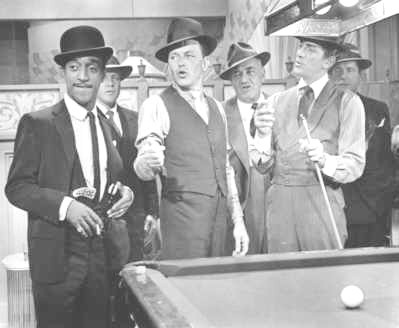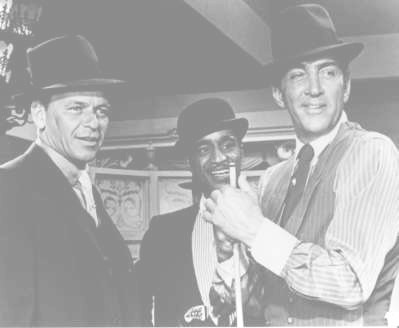| Besides recording nearly 1,500
songs released on scores of records, Sinatra has starred in nearly 60 motion pictures,
often with "Rat Pack" friends Sammy Davis Jr., Dean Martin and
Peter Lawford. He also became a media figure thanks to his turbulent personal life and
"tough guy" posturing, evolving into the symbol of an America long past.

Francis Albert Sinatra was born on December 12, 1915 to an Italian immigrant
coupleliving in Hoboken, N.J. An only child, Sinatra's parents hoped that
their son would become an engineer, but Frank had other plans -- coasting through school
in order to concentrate on athletics and getting into scraps with other boys and the local
police. Working after school for a local newspaper, Frank quickly rose through the ranks
from copy boy to rookie sports reporter, often covering high school games in which he
himself participated. (Sinatra was an accomplished all-around athlete, with a special
interest in boxing.) Not long after graduation Frank began singing in his spare time.
Though he never took formal lessons, he idolized Bing
Crosby and frequently practiced his songs, eventually entering local talent contests.
After winning a prominent radio contest, the Major Bowes Amateur Hour, in 1938, Sinatra
was hired to be a
headwaiter and MC at a small New Jersey club called The Rustic Cabin; in his spare time he
began singing on local radio stations, performing for gas money. Meanwhile, the struggling
young vocalist married his long-time girlfriend, Nancy
Barbato, in February of 1939.
One fateful day in June of 1939, former Benny Goodman sideman Harry James came to the
Rustic Cabin and heard Sinatra singing; he immediately hired Sinatra for hisnew band, the
Harry James Orchestra. After touring with the group for less than six months and
performing with them on the minor single "All or Nothing at All," famed big band
trombonist Tommy Dorsey hired Sinatra away for his ownTommy Dorsey Orchestra. With
Sinatra's smooth vocals charting the group severalTop 10 singles, Dorsey's band became one
of the biggest
acts of the early 1940s. While serving in the band, Sinatra began appearing in movies,
starting with 1940'sLas Vegas Nights. The following year he was drafted by the Army, but
due to an old ear
injury he was given an exemption from service.
By the end of 1942, Sinatra decided to pursue a solo career, agreeing to pay Dorseyone
third of his future earnings and another 10 percent to Dorsey's manager, Leonard
Vannerson. Inking a deal with Columbia Records, Sinatra became a prolific
artist, recording several times a year and releasing a single nearly every month during
the mid-'40s. His concerts became magnets for screaming teenage girls, the forerunners of
modern-day rock groupies, attracting over 25,000 fans for a 1944 New York appearance. As a
youth icon Sinatra used his popularity to endorse Franklin D. Roosevelt's final run for
president, starting a long tradition of political involvement. By 1946 Sinatra was perhaps
America's top performer, selling as many 10 million singles each year and playing packed
houses from coast to coast. Known for his clean-cut, bow-tie image and
popularly referred to as "The Voice," in 1947 Sinatra recorded a whopping 72 new
songs, a personal high mark; he was making almost a million dollars a year at a time when
a new car cost
around one thousand dollars.
Unfortunately that same year he became the subject of serious allegations about his
personal allegiances: in February it was reported that he spent time in Cuba with mob boss
Lucky Luciano and in April he was accused by a Hollywood gossip
columnist of having ties to the Communist Party (he later punched the man in the face!).
Sinatra denied these charges, claiming he was the subject of anti-Italian prejudice, but
rumors continued to dog him over the next few years.

In 1949 the Committee on Un-American Activities claimed
that Sinatra had ties to both the Mafia and the Communists; that same year he was further
disgraced when his affair with actress Ava Gardner was exposed and his wife Nancy
separated from him. Sinatra's record label dropped him, his radio show was canceled, his
talent agency fired him and his film contract with MGM was terminated. Abandoned by the
entertainment industry, Sinatra was ruined and washed up, reduced to borrowing money from
Ava Gardner.
In 1950 Sinatra saw the script for From Here To Eternity and became enchantedby the
character of the Italian soldier Angelo Maggio, for whose part he immediately auditioned.
Accepting less than a tenth of his usual fee, Sinatra put his heart into
the 1953 film, earning an Academy Award for his performance. Sinatra's film career was
reinvigorated, and Capitol Records signed him to a new record deal. With key roles in
hitmovies like Guys and Dolls and The Man With the Golden Arm, Sinatra became as
well-known for his off-the-cuff acting style as his singing, which had not suffered during
his short break from performing. His first three albums for Capitol, Young At
Heart, Learnin' The Blues, and The Tender Trap, each went platinum, proving that despite
leading a controversial personal life, his golden voice was still loved by millions of
fans. 1956's landmark Songs for Swinging Lovers brought Sinatra back to
the top, now an icon for adults rather than teenagers. He threw his support behind
then-Senator John F. Kennedy, who became President in 1960; Sinatra and Kennedy are
believed to have
shared a girlfriend, Judith Exner, but the two men grew apart when Sinatra's now
well-known mob ties became politically embarrassing for the "tough on crime"
President.
During the 1960s Sinatra, no longer with Ava Gardner, was romantically linked to
actressLauren Bacall and dancer Juliet Prowse, but did not marry either woman, instead
tyingthe knot with 21-year-old actress Mia Farrow in 1966, a highly controversial move
forthe 51-year-old Sinatra. The aging singer began performing with "The Rat
Pack,"composed up of Dean Martin, Sammy Davis Jr., Peter Lawford and Joey Bishop.
Sinatraappeared in movies (such as 1960's Ocean's Eleven), toured, and recordedwith the
'Pack in various combinations; the group became known for their uniqueslang and
"swinging" image. Sinatra maintained his tough reputation by threateningclub
owners and musicians whom he didn't like, engaging in occasional drunken outbursts; he was
often seen
with mob figures such as Sam Giancana, a close friend.
"Old Blue Eyes," as he was now known, began to fade from the limelight duringthe
late '60s as he grew older and less relevant to contemporary music. Followinghis last No.
1 hit, 1966's
"Strangers in the Night," Sinatra began experimentingwith jazz and other forms
of music, but became stale. On March 23, 1971 heannounced his retirement from music, eager
to spend more
time with his family, includingthe three children he had with Nancy. The following year he
switched from a bona fide liberal to a right-wing conservative after he was brought before
the House Crime Committee as part of their investigation of the mafia -- Sinatra felt he
was beingvictimized by false accusations. By 1973 he had come out of retirement,
releasingthe No. 15 album, "Ol' Blue Eyes Is Back," later that year. Though he
releasedseveral more albums of mixed-quality material, Sinatra's output trickled off
during the '70s. In 1976 he married yet again, this time to Barbara Marx, the widow of
ZeppoMarx of the Marx Brothers.
Though 1980's Trilogy was critically praised, he did not record much during the decade,
concentrating on live appearances (including several telethon appearances).In 1993 Sinatra
brought new attention to his career by recording a chart-toppingduet album with singers
such as Tony Bennett, Aretha Franklin and Bono from U2;though critically panned (the duets
were recorded in separate studios at separate times!),the album was his best-selling
release to date. The following
year he released his finalalbum, Duets II, more of
the same stuff found on his first Duets album.
After an 80th birthday performance in 1995,
"The Chairman of the Board" retired from music.
STUDIO INTERNET�
This page belongs and was created by Web Master "Maestro
Ney2000".
Copyrighted photos and texts belong to their owners, with all rights reserved.
Addresses pressed over photos doesn't means property.
Esta p�gina pertence e foi criada pelo Web Master "Maestro Ney2000"
Fotos e textos pertencem a seus propriet�rios, com todos os direitos reservados.
Endere�os impressos em cima das foros � significam propriedade. |

